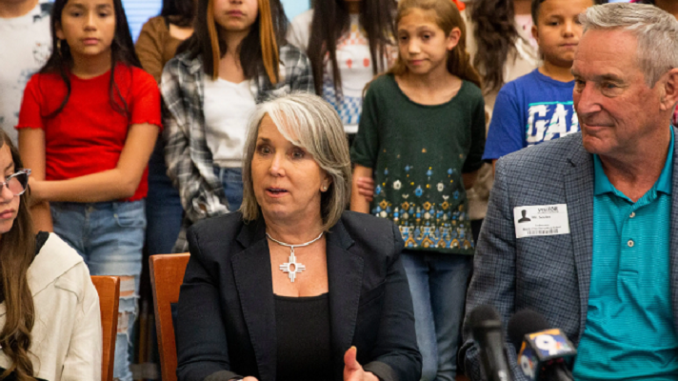
Over 90% of Hispanic families support a comprehensive approach to service provision, including increased funding to make infant and toddler care more accessible for all children under the age of three and allowing more families to qualify for free or subsidized access.
by Gabriel R. Sanchez and Carly Bennett
The passage of the appropriations bill by the United States Congress has had major implications for future generations of New Mexicans by providing funding for the state’s early childhood education constitutional amendment, which was adopted by the state legislature in 2021 and supported overwhelmingly by voters in 2022. The last step to finalizing the state’s constitutional amendment is for the United States Congress to approve it.
The amendment to the state’s constitution will only increase annual withdrawals from the state’s permanent school fund by a modest 1.25%. However, due to the size of the fund, this increase is projected to generate a boost of $236 million for early childhood education and the state’s public schools more broadly. From this amendment, funding is able to expand access to pre-K in New Mexico by 40%, with the inclusion of an increase in instructional hours for select programs, an expansion in the number of seats in classrooms, and a pay raise for early childhood workers. This infusion of resources is in addition to the investments the state has made during Governor Lujan Grisham’s first term in office, specifically regarding early childhood education.
This is a major victory for Gov. Grisham who prioritized universal access to early childhood health and educational development programming during her first term in office. Given the strong relationship between early childhood services and economic well-being over the course of an individual’s life, this investment could be a game changer for the state of New Mexico.
New funding will Help Address Major Challenges and Inequities
Research finds that exposure to early childhood programming early in a child’s life significantly increases economic prosperity for participants in New Mexico, a state where over a quarter (26%) of children under the age of five live in poverty. Roughly a third of children in the state live with families where no parent has regular, full-time employment, and nearly half of families have difficulty paying usual household expenses. Reflecting the economic challenges facing the state’s children, 82.5% of New Mexico public schools are Title 1 schools with 71% of students statewide receiving free or reduced lunch.
New Mexico’s investment in education is sorely needed given its poor ratings across essentially all education outcomes. A recent report found that New Mexico ranks 50th in the nation in reading and math, and only 21% of New Mexico’s 4th graders can read proficiently. There are also stark inequalities based on race and socioeconomic status, with the well-respected Kids Count report consistently finding that Native American and Hispanic students are less likely to be proficient in reading and math, as are students who live below the poverty level.
The infusion of funding to increase access to prenatal care, pre-K programming, and other early childhood services will help ensure that future generations of New Mexico’s children will start their educational paths with the foundations needed to succeed.
Priorities of Hispanic Families in New Mexico
New Mexico’s current legislative session will include discussions regarding how to invest the new early childhood funds during a unique point in state history when the legislature has unprecedented budget revenue at its disposal. Results from the Abriendo Puertas/UnidosUS 2022 National Latino Young Family Survey’s oversample of New Mexico families provides the legislature with fresh data on the values and priorities of Hispanic families with young children in the state. This sample of New Mexicans are the consumers for future early childhood programming and services which makes their opinions highly valuable to the legislature.
Over 90% of Hispanic families support a comprehensive approach to service provision, including increased funding to make infant and toddler care more accessible for all children under the age of three and allowing more families to qualify for free or subsidized access. Recognizing that successful early childhood interventions focus on the full family unit, 93% of Hispanic families support increased funding for parent and family engagement that supports child learning and development and provides more resources for families.
When asked how the state should use the increased investment in early childhood development and education capacity for families with young children, 94% of Hispanic parents and primary caregivers in New Mexico said they supported increasing the salary and benefits of early childhood educators in the state, with 77% strongly supporting this policy. A similarly vast percentage (93%) support the creation of a funding stream to support experienced Latina/o practitioners in earning degrees and credentials so they can join the early childhood workforce. This finding suggests that families have a strong understanding of how wages are related to the quality of care. These policy interventions will not only allow for more families to obtain early childhood services but will also increase the economic well-being of many Hispanic families in the state due to the high concentration of Latinas (and other women of color) in the early childhood workforce.
Finally, the state legislature should review the data showing strong support for more creative approaches to addressing economic equity in New Mexico. This includes 82% support for establishing government savings accounts for children to use in the future for college, retirement, or to help purchase a home. Furthermore, nearly all Hispanic families support guaranteed basic income programs that give monthly cash payments with no strings attached to families to help them meet basic living costs, increase opportunities, and improve their quality of life.
New Mexico as a model for other states
New Mexico has provided a model for other states, and we strongly urge others to consider following their lead to expand early childhood access for young families. This has included building the infrastructure needed to accommodate an expansion of services through the creation of a new state department for early education and care that will help ensure that the expanded funds are able to be translated into programming. Although there is a lot of work ahead, the decades-long push to pass a constitutional amendment to expand early childhood funding will help countless families in New Mexico achieve economic mobility.
The survey data referenced herein was produced independently by a third-party firm, BSP Research on behalf of the Abriendo Puertas/Opening Doors. Outside of his work at Brookings, Dr. Gabriel R. Sanchez serves as Director of Research for BSP Research and was part of the group of scholars who designed and implemented this survey.
Gabriel R. Sanchez, Ph.D., is a David M. Rubenstein Fellow in Governance Studies at The Brookings Institution. Dr. Sanchez is a professor of Political Science and the Founding Robert Wood Johnson Foundation Endowed Chair in Health Policy at the University of New Mexico.
Carly Bennett is an intern in the Governance Studies program at The Brookings Institution.
.



